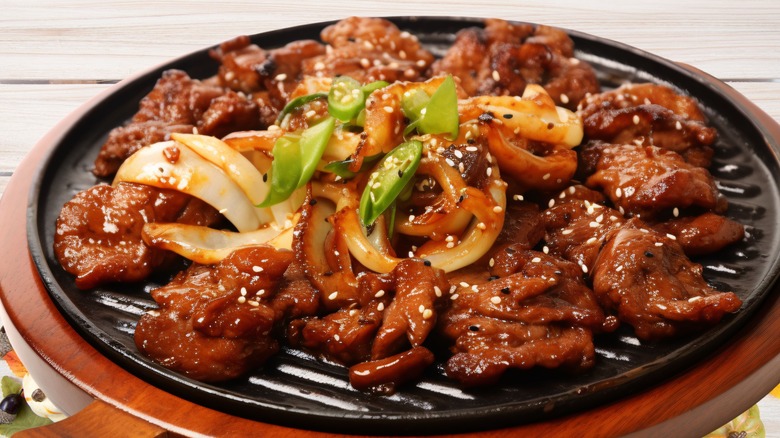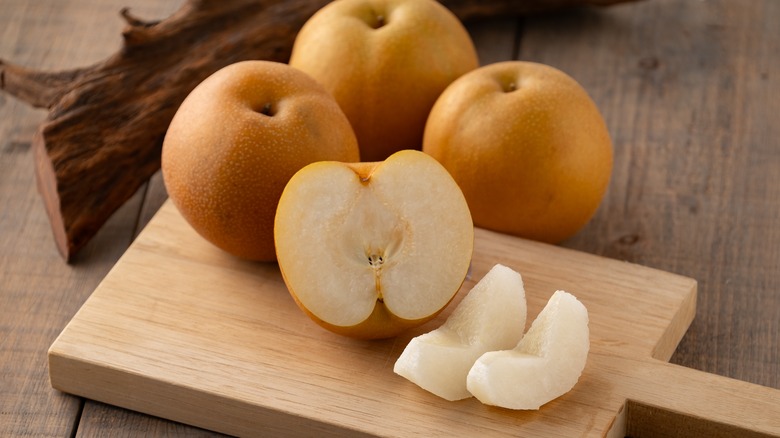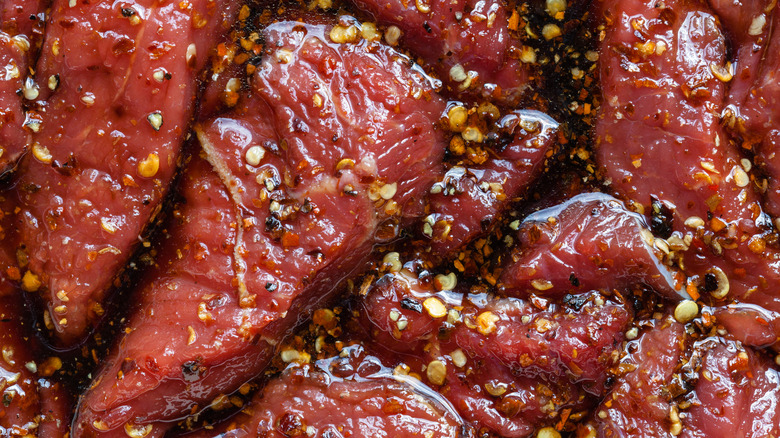The Unexpected Fruit That Does Wonders For Tenderizing Beef
You don't always have to buy expensive cuts of meat to enjoy a delicious beef dish. There are several ways to tenderize those cheaper cuts so they turn out just as tender and juicy as their pricey counterparts. One common method to do this is marinating the beef with fruits like pineapple, papaya, and figs. But did you know you can also use pears to tenderize beef?
If you're familiar with Asian cuisine (especially Korean dishes), then the idea of using pears might not come as a big surprise. Korean barbecued beef — like Galbi (Korean-style short ribs) and Bulgogi — is traditionally prepared by marinating the meat in crushed pears among other ingredients. Apart from tenderizing, the pear also enhances the flavor of the meat with its sweet notes. Once you add the fruit, you can do away with sugar and still create that signature sweet flavor Korean barbecue beef is known for.
Korean recipes typically use Asian pears (also known as Korean or apple pear). It's quite distinct from the other varieties of this fruit, as it's shaped more like an apple and has an unexpected crunchy texture that contrasts the soft flesh of most pears. That said, you can use any other type of pears to tenderize your beef, including the more popular Bartlett.
The science behind pear's meat-tenderizing abilities
All fruits used as meat tenderizers work in a similar way to transform tough cuts into tender servings. But we first need to appreciate the structure of the meat in order to understand the science behind the tenderization process. Meat is made up of muscle fibers and connective tissues that link the fibers to each other and various bundles of muscles to adjacent bones. All these fibers and tissues are made up of proteins and are what maintain the meat's structure. So to make beef softer, you need to break down the proteins or muscle fibers.
In the case of using fruits to tenderize meat, the protein breakdown is caused by proteolytic enzymes found in the raw fruits. Pears carry a cysteine protease that plays this role. Similar protease enzymes are also found in other fruits under different names — such as bromelain in pineapple, actinidin in kiwi, amylases in mango, and papain in papaya.
How to tenderize beef using pears
The process of tenderizing beef using pears involves marinating the meat before cooking. Begin by purchasing fresh pears — avoid using heat-treated or canned fruit since they are exposed to high heat during processing, which can denature the enzymes and prevent them from functioning as required. Wash the fruits and prepare them by either finely dicing, pureeing, or blending them into a paste-like consistency. Alternatively, after blending, you can strain and collect the juice and discard the pulp.
Now put the pureed pear or juice in a mixing bowl and add all other marinade ingredients (if using) before adding the beef. Remember to slice the beef very thinly before marinating because it increases the surface area of the meat and allows the marinade to penetrate the beef much better. Mix well so every surface of the beef is coated in the marinade or pear puree. Pop in the refrigerator and leave to marinade for a few hours. Depending on how tough the meat is and the size, you can marinade for three to 24 hours. After the marination time is over, remove the beef from the marinade and cook it as usual, either in a pan on the stovetop, on the grill, or roast in the oven. Get ready to enjoy the juiciest and most tender beef yet.


